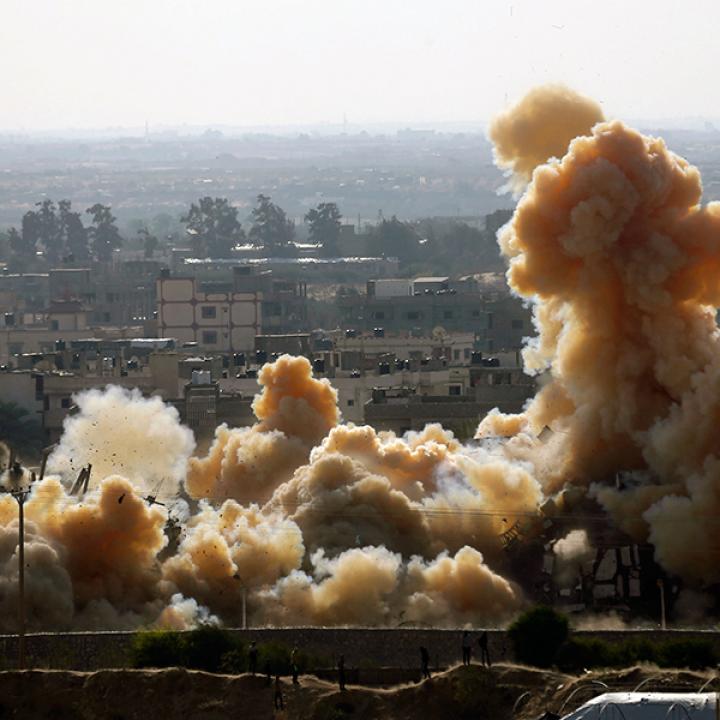
- Policy Analysis
- Fikra Forum
How America Can Help Egypt in its War On Terror

Faced with a stubborn common terrorist enemy, the United States should expand its military support for the Egyptian army’s capabilities, focusing more on training and equipping it to counter the Islamic State (IS) in Sinai. Without increased U.S. military aid, Egypt will be ill-equipped to counter the threat of IS, which will gain a crucial foothold that can expand into other parts of the Middle East. For its part, Egypt must integrate modern counter-terrorism techniques into its military doctrine.
In the past year, IS has lost most of its territories in Iraq and Syria. But having established a powerful base in Egypt since 2013, IS shifted its attention from Iraq and Syria to Egypt. There has been a continuous Islamist insurgency in Northern Sinai led by more than 1,000 IS fighters. The Sinai insurgency has had drastic consequences: the take-down of a Russian passenger plane in 2015 that killed all 224 people on board; the attacks on the Multinational Force of Observers (MFO), including American personnel Task Force of Sinai; the killing of more than 250 people in the al-Rawda mosque bombing of November 2017, and the targeting of Egypt’s Minister of Defense and Minister of Interior during their visit to al-Arish airport in December 2017.
In February 2018, Egypt’s military started Operation Sinai, involving land, naval and air forces, plus police and border guards, to target terrorist organizations in northern and southern Sinai. After two weeks of military operations, Mohamed Farid, chief of staff of the armed forces, asked President Sisi to extend the campaign by at least three months. Farid justified his request by noting the terrorist organizations’ extensive possession of explosives and the hardships that Egypt’s forces face in residential areas. In fact, the Egyptian Army has been incapable of countering IS expansion because it lacks advanced relevant training for its aircrews and enhanced ground forces training in urban combat.
Current American aid to Egypt has strengthened Egypt’s ability for conventional warfare, but has not enhanced the capabilities necessary to defeat IS in Sinai. The Egyptian army’s failure underscores the need to re-evaluate the effectiveness of the $1.3 billion in annual U.S. military support. This aid started as compensation for Egypt’s peace deal with Israel, by providing an alternative arms supplier to Cairo, and establishing a semi-military deterrence between Egypt and Israel. Today, however, the United States cannot and should not shoulder this responsibility alone. European nations, NATO, and Israel also have a vested interest in countering IS threats in this region, and should play an active role in increasing Egyptian counter-terrorism capability.
To be sure, the United States finds it challenging to convince the Egyptian government to accept counter-terrorism training and its integration into its military doctrine. Nevertheless, the U.S. should reorient its military relations with Egypt and build more international support to counter the growing Islamist insurgency in Sinai. The U.S. should also persuade the European counterparts to conduct counter-insurgency training for the Egyptian ground and air forces. Egyptian-European military exercises are still limited to naval operations, which have historically played a role in Egypt’s patrol of the southern Mediterranean Sea and the prevention of illegal immigration to Europe. In light of IS expansion into Northern Sinai, such naval cooperation is insufficient and broader cooperation is needed immediately.
The Egyptian army has been skeptical of any pressure from the U.S. regarding Egypt’s military operations. Egypt has always perceived U.S. military aid in its current form as compensation for the peace treaty with Israel, and would perceive any revision of U.S. military aid as an unfriendly act. But the current landscape offers the most opportune moment to restructure the Egyptian army for fighting the IS insurgency in Sinai, due to the Sisi regime’s need for a quick win to reinvigorate its legitimacy among Egyptians. The U.S. can still pressure the Egyptian leadership to change its arm deals priorities to include the needed counter-terrorism tools.(Instead, to cite but two examples, Egypt has recently bought German submarines and two French amphibious helicopter landing vehicles last year, from national funds.) Finally, on the non-military side, the Egyptian priorities towards Sinai should include a development plan providing basic infrastructure and creating job opportunities for the local Sinai Bedouin, who were marginalized for decades.


